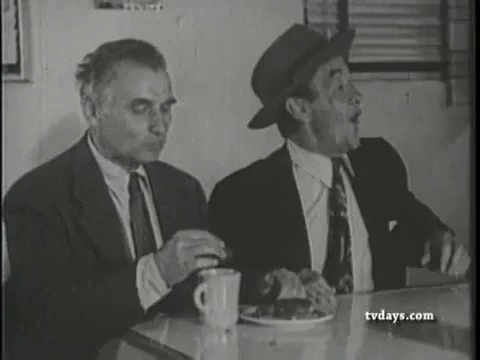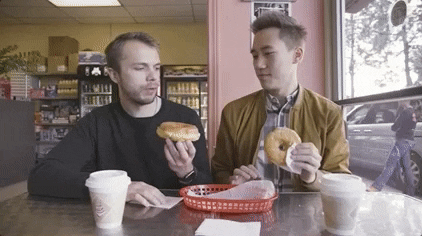The donut shop’s coffee is mediocre. But the donut shop is on my way, and I’m running late, so I stop in for a cup.
The man ahead of me is a regular, I think.
“How’s your husband doing?” he asks. “I’m pulling for him.”
Holding back tears, the woman behind the counter explains that her husband is dying.
“The doctors say all they can do is make him comfortable,” she says. “Yesterday, he opened his eyes for a few minutes, but that’s it.”
The regular shakes his head.
“It’s a damn raw deal,” he says. “I’m real sorry.”
“I don’t know how to explain it to the kids,” she says.
“Yeah…”
They both look at the floor for a moment. Then she grabs him a jelly donut. He hands her the money, tells her to keep the change.
“Take care of yourself,” he says. “See you tomorrow.”
I’m next in line. For a moment, I’m at a loss for words. I don’t know the woman who owns the donut shop, don’t know her husband, or her kids. But I know her pain. I’ve said goodbye to loved ones too. I’ve tried to explain the inexplicable to those left behind. And I’ve had to find ways to keep going through those raw days that begin when the doctors say there’s nothing left to do—days that don’t really end when the Rabbi leads us in the mourner’s Kaddish, or the last night of Shiva, or even the one-year mark when a Jewish son returns to his father’s grave for the first time since the funeral to place the headstone.
A therapist once told me that when we know someone we love is dying, we pre-grieve. That is, we experience aspects of grief even before we’ve truly lost someone. The same therapist told me it takes about a year to process grief, give or take. I suppose that tracks with Jewish custom, which gives you a year to mourn, before insisting that you move on with your life because life is for the living. After my dad died, my friend Norm echoed the idea that this kind of pain takes about a year to process, but then he said, “that’s all bullshit, it takes about two years, and honestly, that’s bullshit too, because the pain doesn’t really go away, but it does get easier somehow.”
Part of me wants to tell the donut shop woman what I know about loss and grief, but another part of me knows better. There’s nothing I can say to make it make sense, no words to bandage her heart, no insights to set her mind right. The best I can do, I think, is to see her pain, then play it by ear.
“Are you OK?” I ask.
The old woman is crying now. Her face is slick with tears. It’s the kind of crying that simmers, but never really boils over. It takes a moment, but she says she’s OK. I don’t believe her, and I don’t think she believes herself. But she needs to be fine right now. She’s got a donut shop to run, among other things.
“What can I get you?” she asks.
“Just a cup of coffee with room for cream,” I mumble.
“We don’t have any whip cream,” she says.
“That’s OK, I just want room for cream.”
It sounds clear to me, but I guess I mumble again because she repeats, “we don’t have any whip cream.”
This time, I point to the cream sitting in a bucket of ice on the counter. With a gentle voice, I say, “room for cream.” I’m careful to sound out each word. Then I add that I am a mumbler.
“Room for cream!” the woman says.
Then, she bursts out laughing.
“Whip cream,” she chuckles. “I thought you said whip cream, and I thought, that’s so crazy—whip cream in coffee.”
“I heard whip cream too,” says the man behind me in line.
“Whip cream,” the donut shop woman says. “For some reason, I thought whip cream is so funny!”
The woman roars with laughter. Her tears of pain give way, briefly, to tears of joy. Not that whip cream in coffee is much of a joke. Heck, it barely qualifies as a comedic misunderstanding. But sometimes a cheap laugh helps.
And if you use Substack Notes, please hit that Restack button🙏
Big shout out time!
A huge donut of a thank you goes out to Tracy Fletcher for buying an annual subscription. Thank you, Tracy!
My writing super power is turning Lyft rides, awkward yoga classes, conversations about hot sauce, visits to porn conventions, Raiders games, working as a PA at Richard Nixon’s funeral, McDonald’s breakfast, and cheese boards into the stories you love. Paid subscriptions help me carve out time from my freelance writing schedule to amuse you. Paid subscribers get a shout out, exclusive Situation Normal stories, and full access to the archives Will you support Situation Normal?
Stick around and chat
You know the drill. I’ve got questions, you’ve got answers.
When you see a stranger in pain, do you lean in, step as far away as possible, or try to say something comforting, even if it’s kinda trite? No wrong answers here.
How long does grief take? Bold answers encouraged!
On a lighter note, I added an old fashioned donut to my order because I find it impossible to enter a donut shop without buying a donut. Do you have the same problem? Bonus: what’s your go-to donut?
Are old fashioned donuts the way all donuts used to be back in the olden days? Explain.
Have you ever put whip cream in coffee? Tell your story!
Want more Michael Estrin stories? I’ve got two books!
Ride/Share: Micro Stories of Soul, Wit and Wisdom from the Backseat is a collection of my Lyft driver stories🚗🗣
Not Safe for Work is a slacker noir novel based on my experiences covering the adult entertainment industry💋🍑🍆🕵️♂️
The ebook versions of my books are priced between 99 cents and $2.99, so if you don’t have the budget for a Situation Normal subscription, buying an ebook is a great way to support my work. Bonus: you get an awesome book too!
*If you bought one of my books, thank you! Please take a moment to leave a review. It helps a lot💪🙏
Quick housekeeping item
Last week, I mentioned that I was bringing back the Wednesday post as an experiment, and that I was considering restricting paid subscribers. After some feedback from the Situation Normal community, I’ve decided that paid comments are a dumb idea. So those are out. I also realized that I’d rather post whenever I have something to say. Sundays will stay the same, but you can expect occasional posts from me during the week. Sometimes that might mean two or three posts. Other times, I might not post at all. I promise not to waste your time, or overwhelm your inbox. Usually, the weekday posts will be free to everyone, but sometimes I’ll write weekday posts just for paying subscribers as a special thank you to them.








In response to your first question, a Lemony Snicket quote comes to mind: “When someone is crying, of course, the noble thing to do is to comfort them. But if someone is trying to hide their tears, it may also be noble to pretend you do not notice them.”
That being said, I’m afraid we live in a world in which people are increasingly prone to isolation and less likely to comfort a stranger.
You so beautifully capture what it means to be human in this piece. The sorrow, the tenderness, the awkward weirdness, the humor.
I don’t think grief ever goes away. I might think about that loved one less often, but when I do think of them, the grief is still there.